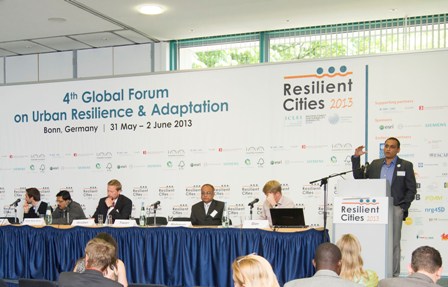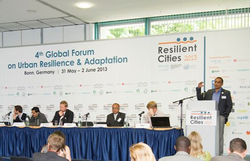South Asian cities and tools on stage at Resilient Cities 2013

South Asian countries, as many others in Asia, are particularly vulnerable to climate change – cities in this region are however not just waiting to react to future problems but, led by ICLEI South Asia, are taking pro-active measures to get ready to face the upcoming challenges brought by a changing climate. The wealth of tools, experiences and recommendations gathered so far and still under development was presented during the Resilient Cities conference, that took place on 31 May – 2 June in Bonn, Germany
"Taking the right decisions under uncertainty: What do local governments need?" was the tagline of the session organised as part of the AsianCitiesAdapt (ACA) project and that looked into the challenges which local government decision-makers, who have embarked on an adaptation process, are confronted with. The session analysed the interface between science on one hand and policy/practice at city level on the other one, looking at how researchers and decision-makers can make up for the gaps in knowledge and move forward with their adaptation processes.
Despite the often lack of quality, reliable, and up-to-date data, the need to move forward with those available was emphasised. Language barriers between science and cities were highlighted as another current difficulty; developing local knowledge and capacity building was identified as one of the solutions to it, together with inter-organisation collaboration and coordination and the sharing of information among different countries. Bringing in local universities, scientific, and research partners – as it was done in the ACA project – is another way to fill the knowledge gap and can be extremely beneficial to advancing local adaptation efforts.
The need to involve the scientific community in the city’s resilience planning was acknowledged by Mr Chammany, Mayor of Cochin, one of the Indian cities involved in the project, who stated "Scientists have knowledge, politicians have power. Combining the two will bring social change".
______________________________________________________________________________________________________________________
The ICLEI-ACCCRN Process, developed by the ICLEI South Asia and Oceania Secretariats was also presented at the conference, as one of the main climate resilience planning tools specifically for local governments in Asia currently available. The toolkit, that outlines a simple yet rigorous, and replicable process that developing cities can follow to design climate resilient strategies, was showcased during the session “Enabling local action on adaptation: Planning and policy tools and frameworks”. The issue of resilience planning in Asian cities was further discussed in “Building resilience for the urban poor in Asia: Spotlight on ACCCRN”. The sessions tried to deepen the understanding of the relationship between poverty, vulnerability, and resilience and to showcase tools and frameworks designed to build local capacity for the development and implementation of resilience strategies.
The lively discussions that followed the presentation of the toolkit and of the other interventions led to some interesting insights into the issue of resilience planning, very much in line with the thinking behind the ICLEI-ACCCRN Process. A key message that emerged from both sessions is the necessity to develop multi-stakeholder partnerships and dialogues that allow local governments to actively cooperate with the urban poor in their communities. Vulnerability assessments, as foreseen by the ACCCRN toolkit, must be conducted very early on to develop customized, inclusive and effective policies that will alleviate stress on the urban poor, while allowing the city to work towards increased resilience. Poverty, vulnerability and resilience are all closely connected and need to be addressed simultaneously, shifting the focus of resilience from infrastructure towards equity and inclusion. Framing resilience solutions according to the values of the urban poor will ensure more likely acceptance, ownership and take-up of the planned measures.
Many of the outcomes of the sessions mirror the main learning drawn so far from ICLEI South Asia through the testing of the toolkit in three pilot cities in India: building local capacities and institutional set up to undertake bottom-up processes is crucial to create demand and attract donors; starting with ‘soft measures’ and ensuring political support will considerably increase opportunities for the implementation of the local resilience strategies.
Following the successful testing in the three Indian cities, the toolkit will now be implemented in around 40 cities in the South Asian and South East Asian regions.
____________________________________________________________________________________________________________________________
The relevance of vulnerability assessment that emerged in other sessions was then analyzed in more details in “Urban Vulnerability Assessment (UVA) in South Asia: Challenges and lessons learnt”. The session was inspired by the UVA project that ICLEI South Asia undertook with the support of GIZ, and that originated from the results of a recent ICLEI – MIT survey, that identified how less than 40% of the surveyed cities had undertaken an urban vulnerability assessment, despite the acknowledgment that such tool is essential to increasing urban resilience.
The experience of Barisal (Bangladesh), one of the cities part of the UVA project together with Panaji (India), presented confirmed the relevance of such an assessment as the foundation for any resilience strategy, allowing the city, on the base of its results, to understand its vulnerabilities and accordingly develop an action plan outlining clear resilience interventions. The local government must take ownership of such process, and therefore see its value and actively use the learning derived from it – as it was the case of Barisal.
Once again, it was clear that the involvement of stakeholders is crucial: bringing in local agencies can help fill the often existing gap in data availability; carrying out structured and inclusive meetings (as mirrored by ICLEI’s UVA’s model, that foresees two rounds of stakeholders’ engagement) contribute to instilling a sense of ownership among the several actors relevant in such a process. Their involvement is essential in identifying the city vulnerabilities and impacts, and in prioritizing the corresponding responses.
The discussion highlighted how the clear involvement of the local government and the engagement of stakeholders not only make Urban Vulnerability Assessments a very valuable tool but, as confirmed by some of the funders present at the session, push them high up on the priority list of funders, who are reassured by the long-term benefits of such a process, thanks to the joint ownership of the city government and community.




